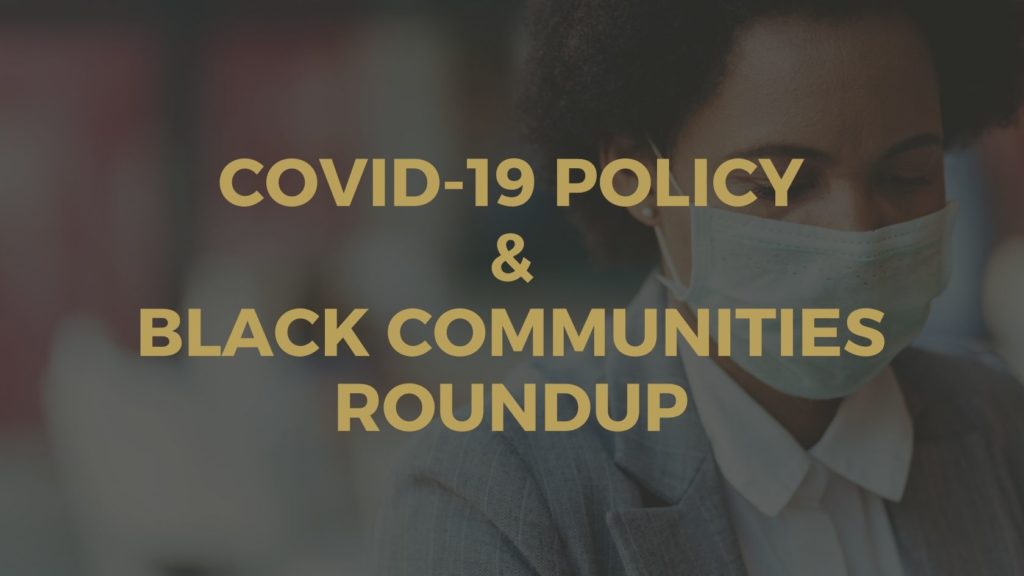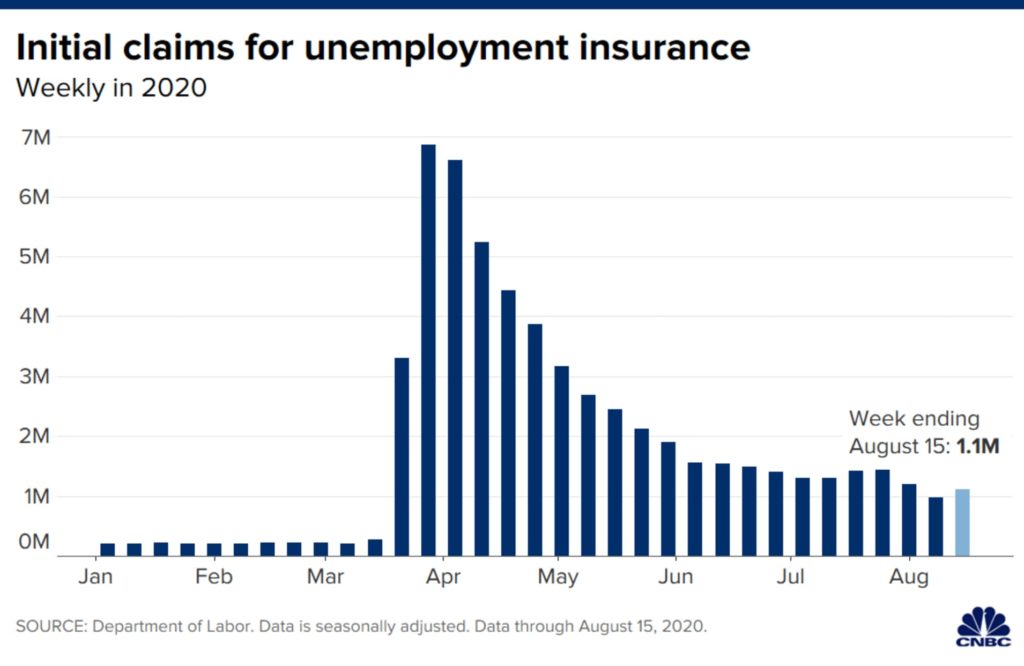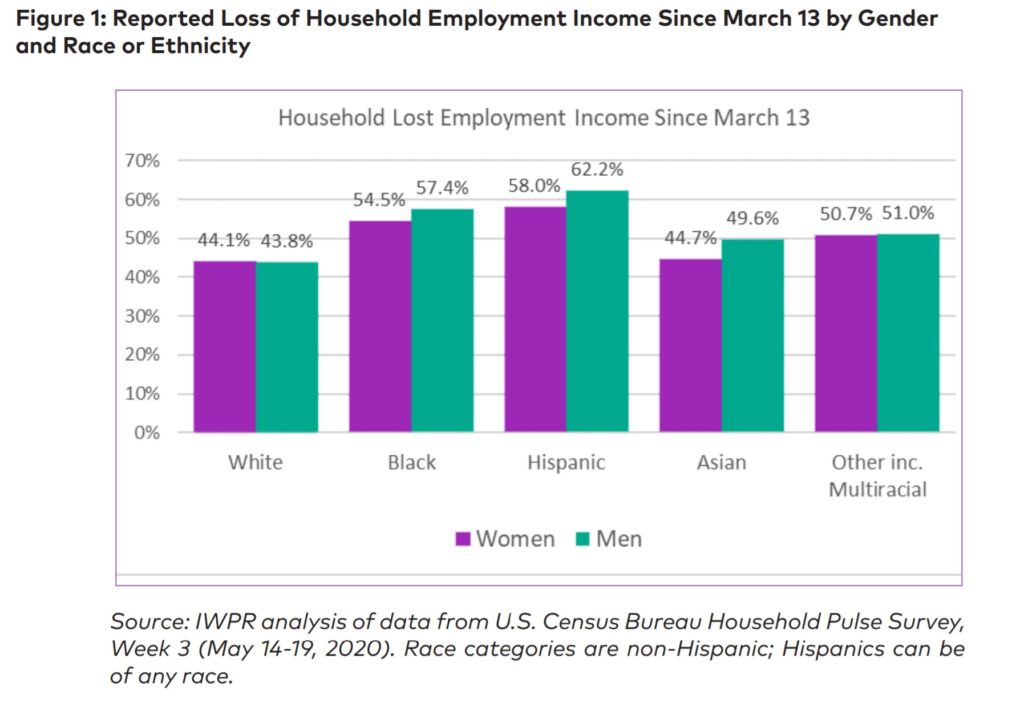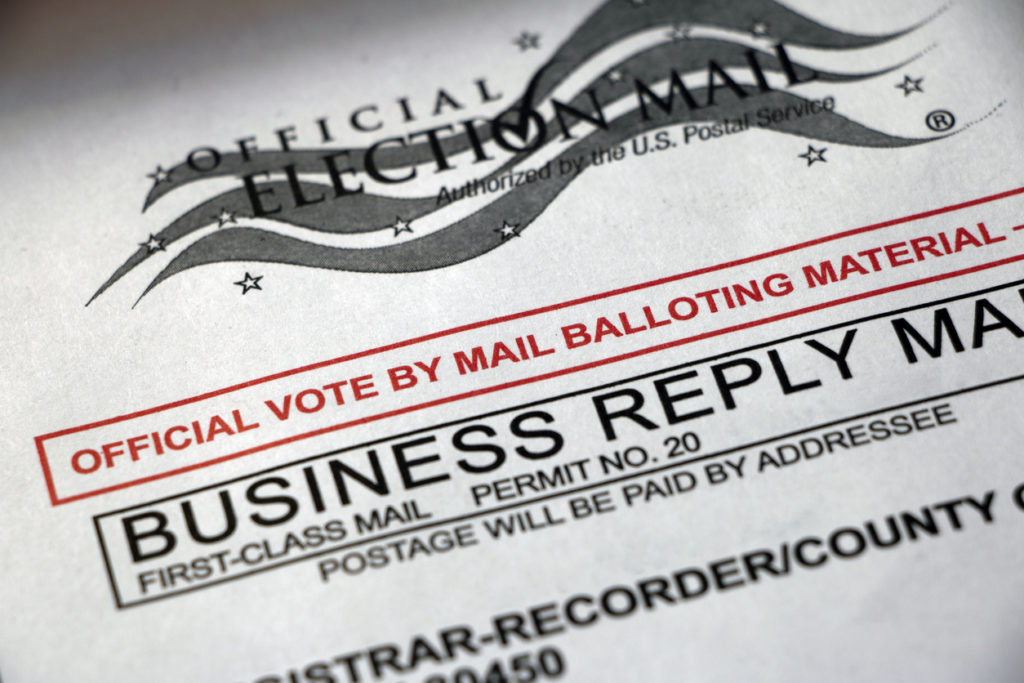
August 25 COVID-19 Policy & Black Communities Roundup
Pressure Mounts to Fully Fund U.S. Postal Service

On Saturday, the House interrupted its summer recess for a rare weekend session to pass legislation to prevent the U.S. Postal Service from implementing operational changes that could threaten the timely delivery of mail-in ballots for the November elections. The legislation passed would also provide $25 billion for postal operations—funding originally included in the Democrats’ $3.4 million COVID-19 stimulus package passed in May. House Democrats also released reports that Postal Service delays were worse than previously indicated by Postmaster General Louis DeJoy.
Senate Majority Leader Mitch McConnell (R-KY) criticized the House bill as “ignoring the urgent needs of American workers and families,” and the White House has threatened to veto the legislation should it pass the Senate.
U.S. Postal Service operations are predicted to be a major factor in the upcoming election, with mail-in ballots deemed a critical option for voting during a global pandemic that has claimed more than 175,000 American lives and counting. Postmaster General DeJoy stated in testimony before Congress last week that cost reduction measures and other changes to postal service operations would be delayed until after the November election. DeJoy, after agreeing to testify in response to Democratic outcry against the changes, asserted in a statement that retail hours at Post Offices will be maintained, mail processing equipment and blue collection boxes would not be removed, mail processing facilities would not be closed, and overtime for postal workers would continue to be approved “as needed.” DeJoy also testified that a Postal Service task force on election mail would be expanded.
Also during the Senate hearing with DeJoy, David C. Williams, former vice chairman of the U.S. Postal Service’s board of governors, testified that DeJoy’s hiring was a part of the politicization of the Postal Service by U.S. Treasury Secretary Steve Mnuchin. Yesterday, DeJoy testified before the U.S. House, and during a 5.5 hour hearing, House Democrats accused him of deliberately withholding internal documents and threatened to issue subpoenas.
Rep. James Clyburn (D-SC), in expressing opposition to proposed cost-reduction plans, stressed the need to view and operate the Postal Service as more than a typical for-profit business, as it provides an essential service.
The Leadership Conference on Civil and Human Rights President and CEO Vanita Gupta says “[t]he postmaster general’s announcement is a step in the right direction,” but the group continues to advocate that “Congress must immediately vote to allocate $25 billion to support the Postal Service and provide $3.6 billion to state and local governments to fund our elections.”
Senate Republicans Reportedly Drafting Scaled-Down Relief Bill
Senate Republicans began work on a $500 billion coronavirus relief package, about half the size of the stimulus package it had initially proposed. The smaller package would include extended benefits for the unemployed and for small businesses, funding for education, and $10 billion for the U.S. Postal Service.
Call for Diversity on Coronavirus Oversight Commission
Last week, a bipartisan group of House legislators called on Speaker Nancy Pelosi (D-CA) and Senate Majority Whip Mitch McConnell (R-KY) to expand the Congressional Oversight Commission (created as part of the CARES Act coronavirus relief package enacted in March). In a letter to the congressional leaders, the group notes that previous reports from the Commission “have failed to substantively focus on the disparate impacts and challenges faced by diverse communities as a result of COVID-19, or the strategic delivery of relief to these important communities.” This follows advocacy from Joint Center Board Members Paul Thornell and Robert Raben, along with Inclusive America Co-Founder Mark Hanis, and a bill introduced by Senators Cory Booker (D-NJ), Kamala Harris (D-CA), Bob Menendez (D-NJ), and Chris Van Hollen (D-VA) on increasing diversity on the five-member commission which includes only one woman and no one of African American, Latinx, Native American, or Pacific Islander descent.
For more on Congress and the COVID-19 stimulus this week, see the National Urban League’s Washington Bureau Insider.
Economic Studies & COVID-19

Initial weekly unemployment claims topped one million again, reaching 1.1 million for the week ending August 15. Prior to the coronavirus pandemic, the single-week record high was 695,000 claims in 1982.
The National Women’s Law Center urged Congress to provide at least $50 billion to the child care industry to fund premium pay for child care workers, cover operational costs, and reduce cost burdens for families. Black women make up 19% of the child care industry, which lost over a third of its workforce between February and April 2020.
Groundwork Collaborative Deputy Executive Director Angela Hanks criticized White House advisor Ivanka Trump’s new skills training initiative for missing the mark. Hanks stated, that “[i]t’s clear that millions of Americans are out of work not because they lack the skills to get a job, but because the government has failed to contain the pandemic and mitigate the devastating economic fallout.”

COVID-19 continues to expose inequities in the Black community including food and health inefficiencies. The Institute for Women’s Policy Research pointed out that “[a]mong Black women in households without a loss of employment income since March 13, 12.6 percent report insufficient food compared with 27.7 percent in households that experienced a loss of employment income. Among white women without income loss, 4.4 percent report insufficient food in their households compared with 11.7 percent of those reporting employment income loss.”Harvard T.H. Chan School of Public Health Dean Michelle A. Williams explained that the COVID-19 crisis has laid bare the issues of vast disparities for people of color in education, job opportunities, wealth and health care, and emphasized the need for “radical, large-scale investment” to address the crisis.
Building on their previous report that analyzed the disproportionate harms of COVID-19 on by Black workers, the Economic Policy Institute’s most recent report examined the impact on Latinx workers, noting “Latina workers experienced the largest increase in unemployment between February and April, an increase of 15.3 percentage points.”
Community Development Financial Institutions (CDFIs) are gaining more attention and investment from private investors, Congress, and large corporations to help close the economic gap between Black and white communities. Citing the U.S Small Business Administration (SBA), the Wall Street Journal noted that as of August 8, CDFIs accounted for $7.5 billion of the Paycheck Protection Program’s $525 billion in approved loans for small businesses across America.
Emphasizing that Black and Latinx households are unbanked at much higher rates than their counterparts, Brookings Institution fellow Aaron Klein recommended a three-pronged approach to ensure that all Americans can receive emergency financial assistance funding more quickly during a crisis.
Political Studies & COVID-19

More than 534,000 mail ballots across 23 states were rejected during the presidential primaries this year, according to the Washington Post. This figure exceeds the 319,000 tossed mail ballots in the 2016 presidential general election. In our report Pandemic Relief Priorities for Black Communities, the Joint Center called on Congress and the Administration to take specific steps to ensure that vote by mail is accessible and secure.
NBC News highlighted the efforts of Black women in various voting rights movements over the last 100 years, pointing out that “although the [19th] amendment, which was ratified 100 years ago Tuesday, eased the obstacles some women faced at the ballot box, Black women still faced legal barriers.”
National Vote at Home Institute and the Silver Linings Group have secured the arenas of eight major pro sports teams to serve as large safe in-person polling locations in November. The NBA’s Indiana Pacers, Los Angeles Clippers, Milwaukee Bucks, Washington Wizards; the NFL’s Pittsburgh Steelers; the MLB’s Boston Red Sox; and the NHL’s New Jersey Devils and the Washington Capitals have signed up for the effort which is expected to provide shorter lines and better social distancing opportunities.
Election administrators and staff are reportedly leaving their positions due to backlash from long lines and limited in-person polling sites during the primary elections held during the coronavirus pandemic. According to ProPublica, more than 20 local election administrators have resigned or retired since March 1, citing burnout, stress, or health concerns.
Research continues to show that age and location are determinants to coronavirus exposure in the Black community. “Where you live determines your health in the United States,” says Amfar Vice President and Director of Public Policy Greg Millett. Noting that “age-adjusted hospitalization rates from COVID-19 are significantly higher among Black, Hispanic, and Native American populations,” the Brookings Institution warns that “urban communities of color may be exposed to disproportionately poorer air quality, exacerbating health risks” although“other circumstances likely contribute, including socio-economic, geographic, employment, and other health factors.” Studies show that people of color in the U.S. are more likely to die from COVID-19 at a younger age than white people (11% of Black people who die from COVID-19 are under 55, compared to 8% of Asians, 18% of Latinos, 24% of American Indians, and 3% of white people are under 55). According to the Environmental Working Group, a CDC study showed that “of 576 hospitalized kids, almost half were Hispanic, about 30 percent were Black, and just 14 percent were white.”
A study published on the Journal of the American Medical Association Network by researchers at Ascension Health in St. Louis finds that after adjusting for insurance status, underlying conditions, neighborhood deprivation, site of care, and other factors, the risk of death from COVID-19 was “not significantly different” between Black and white hospital patients.
USA Today reported on a study by the Trust for Public Land that public parks that tend to serve people of color serve more people (533 people per acre) than public parks that serve predominately white communities (58 people per acre), and that this may contribute to an enhanced spread of COVID-19 in communities of color.
CNN reported that “while Black people and Latinos account for more than 50% of Covid-19 cases nationwide, so far they make up only about 15% of participants in the nation’s first large-scale clinical trial to test out a coronavirus vaccine.”
CBS reported on how COVID-19 and racial injustice have affected mental health in Black communities.
Diverse spoke with Daniel E. Dawes, Director of the Satcher Health Leadership Institute—which partners with the Morehouse School of Medicine on the $40 million grant to fight COVID-19 in vulnerable communities—about the project and how other HBCUs can also benefit from similar partnerships.
National Council of Negro Women President and Chair of the Board Dr. Johnetta B. Cole penned an article in The Root calling for communities of color to complete the 2020 census, emphasizing that the results will direct more than $1.5 trillion annually for the next decade through federal programs.
Concerns continue to mount over Black students returning to school safely and with proper online resources with nearly one-third of students lacking high-speed Internet at home, according to the Washington Post. School districts across the country are finding innovative ways to provide students with internet access. Scholar Andre Perry penned an article for Essence detailing how homeschooling could be transformative for Black students and their families. (HBCUs) are rolling out back to school plans from fully online to limited on-campus instruction. In the Joint Center’s report, Pandemic Relief Priorities for Black Communities, we urge lawmakers to expand internet access among Black households. In April, the Joint Center also held a briefing with FCC Commissioner Geoffrey Starks and other experts to discuss the concept of a “connectivity stimulus” to ensure that people in all communities in the United States are connected and have access to online education and economic opportunities during and following the COVID-19 crisis.
Movement Building
Black Futures Lab hosted a virtual yoga session to rest, reflect, and restore bodies, minds, and emotions.
Color of Change issued a petition to Mayor Bill de Blasio, Muriel Bowser, and Lori Lightfoot to demand their support and adoption of guaranteed income to protect Black households and citizens at large.
Essence released part two of their three-part series, COVID-19’S IMPACT ON BLACK COMMUNITIES: COVID-19 And Mass Incarceration.
The Leadership Conference on Civil and Human Rights issued a petition to save the United States Postal Service, an essential government institution for voters, seniors, veterans, and “people who depend on it for their livelihood.”
The NAACP filed suit against the USPS and USPS Postmaster General Louis Dejoy in an attempt to “restore prompt and reliable mail delivery postal service” and prioritize mail-in ballots for the upcoming election.
The National Domestic Workers Alliance is encouraging people to tweet their Senators demanding relief for domestic workers who are experiencing food insecurity and fear of eviction.
Events
Upcoming events include: “Can we Alleviate Racism and Systemic Inequality by Expanding Broadband During COVID-19?” (Brookings, August 25); “Community Engagement During COVID-19” (Knight Foundation, August 25); “Building a Future: A Discussion on ‘Stockton on My Mind’” (African American Mayors Association, August 26); “Homeless Youth and Education in the Time of COVID-19” (National Law Center on Homelessness and Poverty, August 26); “Divest to Save Black Lives. Invest to Heal Communities: Centering Impacted Voices to Reimagine a New Vision of Justice” (CLASP, August 27); “Investing in Energy and the Environment Post-COVID” (REMI, September 3); “Economic Forecasting Uncertainty on the U.S. Economies” (REMI, September 9).
Last week, events were held by African American Policy Forum, Black to the Future Action Fund, Brookings, CBC, Center for American Progress, Knight Foundation, Politico, The Raben Group, and Third Way.
Podcast
How has COVID-19 transformed work, education, and healthcare? (The Brookings Institution)
The Joint Center thanks the Annie E. Casey Foundation, the Boulé Foundation, the Democracy Fund, Toyota Motor North America, Inc., UPS, and the Walmart Foundation for additional support that has allowed us to do some of our COVID-19 and Black Communities work.

